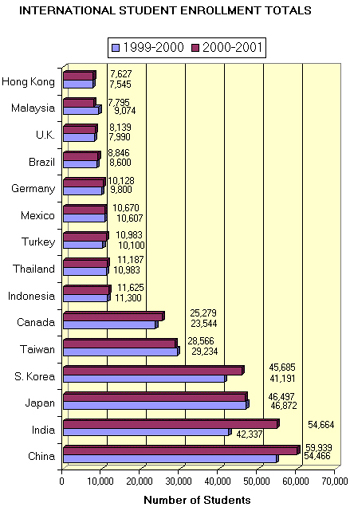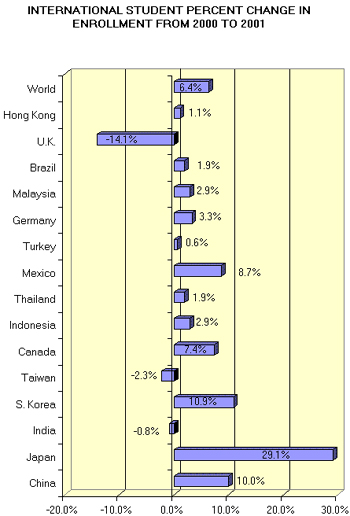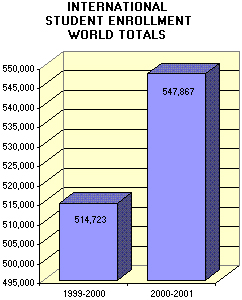WENR, Nov./Dec. 2001: Americas
Regional
Engineering Goes Global
Old Dominion University, in conjunction with eight universities from Finland, France, Germany, Ireland, the Netherlands, Poland, Sweden and Switzerland, recently created a master’s degree program in global engineering.
This program allows students to spend one semester at Old Dominion in Virginia and two semesters abroad at the university of their choice.
The participating universities are members of the International Network for Higher Education in Engineering.
Project management, computer engineering and telecommunications are some of the courses offered at Old Dominion; course offerings at the European institutions include product innovation, biomedical engineering and technical informatics in engineering.
English is the language of all course instruction.
The semester at Old Dominion requires tuition, but the semesters abroad do not; however, students must pay for their transportation and living expenses. Participants may also receive additional degrees from the collaborating institutions.
— The Chronicle of Higher Education
Oct. 12, 2001
Canada
MBA Program Reaches Global Audience
Canada’s Queen’s School of Business now offers a full-time, one-year master’s degree in business administration as well as an executive program. Because of the school’s isolated location, courses are offered via videoconferencing, utilizing the facilities of large corporations to minimize costs. The success of this program has inspired other institutions to start developing part-time, one-year MBA programs.
— Financial Times
Oct. 22, 2001
Qatar invests in Canada
His Highness Sheik Hamad bin Khalifa Al-Thani, emir of Qatar, recently announced plans to invest more than CAN$500 million over the next 10 years in a new Canadian College of Technology. The soon-to-be established institution will offer certificates and diplomas in 32 fields of study, and enrollment is projected to reach 3,000 from the initial 300. The Canadian Bureau for International Education (CBIE) will act as the executive agency in the school’s development. CBIE plans to work closely with the College of the North Atlantic, which will aid in the establishment of the new school.
— The Canadian Bureau for International Education
June 4, 2001
Chile
U.S. Teams up With World Bank to Improve Quality of Education
The World Bank and United States have joined forces to financially support Chile’s Higher Education Quality Improvement Program. The program will implement reform measures to Chile’s higher education system, focusing on three main areas: 1) developing and implementing a national accreditation system; 2) strengthening the links with national development and qualitative improvement at the technical, undergraduate and postgraduate level; 3) improving the administration of higher education.
Two accreditation commissions, at the undergraduate and postgraduate levels, will ensure the quality of higher education credentials. Accreditation will be based on self-evaluation, external peer review and academic audit.
— International Higher Education
Fall 2001
Colombia
College Professors Become Latest Victims in Civil War
According to the Chicago-based Scholars at Risk, Colombia has become the world’s most notorious nation for violence against academics. At least 27 professors, students and university officials have been murdered since the beginning of 1999. Authorities blame the violence on the United Self-Defense Forces of Colombia (AUC), a paramilitary organization that has declared war on the political left. The AUC is officially illegal, but many Colombians claim that its troops are being used by the government to help root out and destroy leftist guerrillas.
Although the war between the ultra-right and leftist insurgents has mainly been played out in the street, the conflict recently spilled over onto university campuses where students and professors perceived to be pro-leftist have become targets. Among the hardest hit has been the University of Cordoba where five professors and four students have been killed since 1998. Professors at the university went on strike to demand better protection after the head of one of the school’s faculties was forced to resign because of death threats made against him. Last year the Ministry of Interior received 2,000 requests for protection from threatened scholars. Twice that number was reported this year.
— The Chronicle of Higher Education
Nov. 2, 2001
United States
Anthrax Scare Foils Application Deadlines
The recent anthrax scare in mailrooms on the East Coast is complicating the admissions process for some students and colleges. The early-decision application deadline for many colleges was Nov. 1, enabling a notification date of mid-December. Although many students turned to FedEx, United Parcel Service and the Internet to assure the timely arrival of their applications, some universities have extended their deadlines. However, these extensions may cause delays in the universities’ notifications to students.
— The New York Times
Nov. 2, 2001
Harvard Honors Losing Luster?
Graduating with honors is a highly sought after status symbol at Ivy League institutions. However, last June an unprecedented 91 percent of Harvard University seniors received this distinction. Although many students at Harvard may in fact be doing honor’s work, the concern is that too many distinctions render the honor’s designation null and void. The disproportionate number of honors compared to other renowned universities indicates a possible problem with the school’s grade inflation and achievement expectations.
A study conducted by the Boston Globe revealed that while schools such as Princeton and Yale have addressed the grade inflation trends, Harvard has chosen to ignore the issue. While Harvard virtually guarantees honors to any student who receives at least a B average, the other institutions also look at the student’s class ranking.
Like Harvard, Dartmouth’s system is based on grades, but only one-third of the graduating senior class receives distinction. Dartmouth students receive two grades for each course. One grade indicates the individual’s earned grade and the other is the median grade of the class. These two grades demonstrate a student’s comparative performance.
— Boston Globe
Oct. 9, 2001
Largest Increase of International Student Enrollments in U.S. Since 1980
Open Doors 2001 reports that the number of international students enrolled at colleges and universities in the United States rose 6.4 percent during the 2000/2001 academic year to reach a record total of 547,867. This is a significant increase over last year’s total of 514,723 students and continues the upward trend in international enrollments that began in 1997, following a four-year period of minimal growth.
The report, published annually by the Institute for International Education, with support from the State Department’s Bureau of Educational and Cultural Affairs, revealed notable increases from China, India and South Korea. For the third year in a row, China has sent the largest numbers of students to the United States for higher education (59,939 this year). There was a 29 percent increase from India, which for the first time surpassed Japan as the second largest provider of international students.
Although Japanese student enrollments dropped by almost 1 percent, Japan came in third this year. The number of students coming from Korea increased by nearly 11 percent. In 1998/1999 Korean student enrollments dropped off precipitously by 9 percent due to the Asian economic crisis, but Korea has now surpassed its previous high after two years of steady growth.
See graphs below, which illustrate the data supplied by Open Doors 2001:



